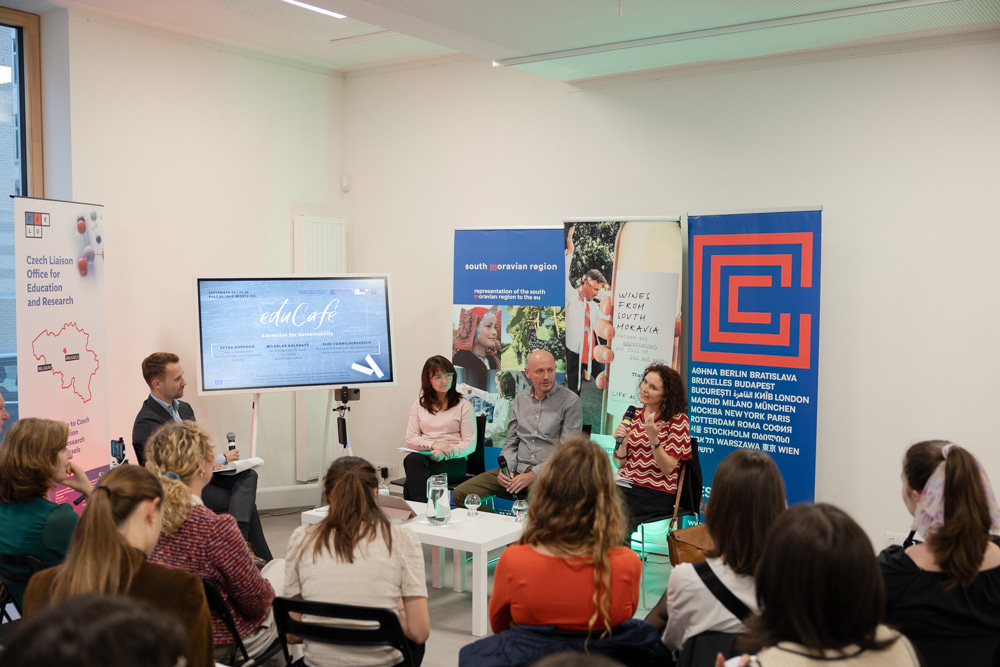This year's last EduCafé focused on traditional approaches and new trends in environmental education
September edition of EduCafé showed not only dilemmas and challenges, but also new approaches in education for sustainability.
On Wednesday 25 September, together with the Czech Centre Brussels and the Representation of the South Moravian Region to the EU, we organised the last EduCafé of the year. The event took place at the KULT XL in the heart of Brussels' European Quarter and attracted around 40 participants. The invitation was accepted by Miloslav Kolenatý, a senior lecturer and researcher from the Faculty of Environment at Jan Evangelista Purkyně University, Petra Koppová, an educator and methodologist specialising in environmental education, with a particular interest in outdoor learning, from the Lipka organisation, and Elke Vanwildemeersch, a policy advisor on Sustainability Education at the Duurzaam educatiepunt (Sustainability Education Hub) of the Department of Environment and Spatial Planning of the Flemish government. The debate was moderated by Tomáš Polák, a PR expert based in the European Parliament.
Developing transversal skills and good habits
At the beginning of the discussion, the guests commented on the role of sustainability education in the curriculum and the skills that some pupils may (perhaps surprisingly) lack and which should therefore be encouraged in their education. Elke Vanwildemeersch explained that the Flemish government is trying to take a comprehensive approach to this topic, starting with environmental education in kindergarten or primary school and then gradually broadening the perspective from local to global. Miloslav Kolenatý added that in the Czech context, this topic is currently lacking in the curriculum, but this should change in the coming years. All three guests agreed that the most important skills to teach children and pupils include media literacy and the ability to think about issues in a broader and interdisciplinary way. It is therefore crucial to build the habit of critical thinking in children and young people. Petra Koppová, who works directly with the youngest pupils, confirmed that children often lack the ability to connect their acquired knowledge to a broader context, and if they already verify the facts, they often do not look further into the sources of information. It is also important to mention that today's young generation often grows up without direct contact with nature, which leads to a society that loses touch with natural cycles and processes and does not protect the environment sufficiently.

Local level as a springboard for systemic change
One of the most important issues in environmental education is also the polarisation that we can see between different population groups. A good way to reduce this polarization, according to the guests, is to communicate about climate change and sustainability issues mainly at the local level. This means giving concrete examples from the field, while allowing all stakeholders to express their viewpoints in a calm and respectful atmosphere. After all, quality dialogue is the way to promote critical thinking and quality democracy across generations. As Elke Vanwildemeersch also added, one way to bring environmental issues closer to individual schools is to "translate" framework, policy initiatives such as GreenComp at the European level or the UN Sustainable Development Goals (SDGs) at the global level into the "language" of the local and school level. This is why the Flemish Ministry of the Environment is working on the SDGS@School initiative, which shows schools what the SDGs can mean for them and how they can implement them in the classroom and beyond. It also offers them inspiration and support to actively involve pupils in working on the goals. In this context, Petra Koppová highlighted the role of pupils and students as agents of change, for example through small projects where they have the opportunity to work in groups to address specific local challenges and to inspire those around them, including their teachers and parents.
The role of teachers in supporting and inspiring the younger generation
Teachers play a key role in environmental education. However, it is important to recognise that in many respects their possibilities are very limited and wider systemic changes are needed. As was said during the debate, one of the answers to the current crisis is to give the younger generation the space to tackle change on their own initiative, through the aforementioned projects aimed at their entrepreneurship. The teacher should therefore not just be a transmitter of information, but a coordinator of independent student activity. Elke Vanwildemeersch stressed that the key is to teach children to take concrete actions and to lead them to become active citizens who are interested in their environment and future. Transversal skills and the capacity for transformative learning play an important role here, where pupils reflect critically on their experiences and gradually expand their understanding of the world and their own role in it. According to Petra Koppová, it is important to think about the possibilities of teachers as carriers of values and how to prepare future teachers for this role. This was confirmed by Miloslav Kolenatý, who added that this approach is unfortunately still rather foreign to most Czech faculties of education, but environmental education for future teachers is currently provided by various leisure organizations and the non-profit sector, which to some extent fills this institutional gap.
At the end of the event, there were also questions from the audience, for example, on how to bring nature closer to children who spend most of their time in the city. The recipe of organisations like Lipka is to give children the opportunity to engage all their senses and show them the natural world in a practical and fun way.
After the debate, participants could continue informal conversations over a glass of wine and try out a specific activity focused on environmental education thanks to a demonstration by Petra Koppová from Lipka. A video of the whole debate will soon be available on our YouTube channel.